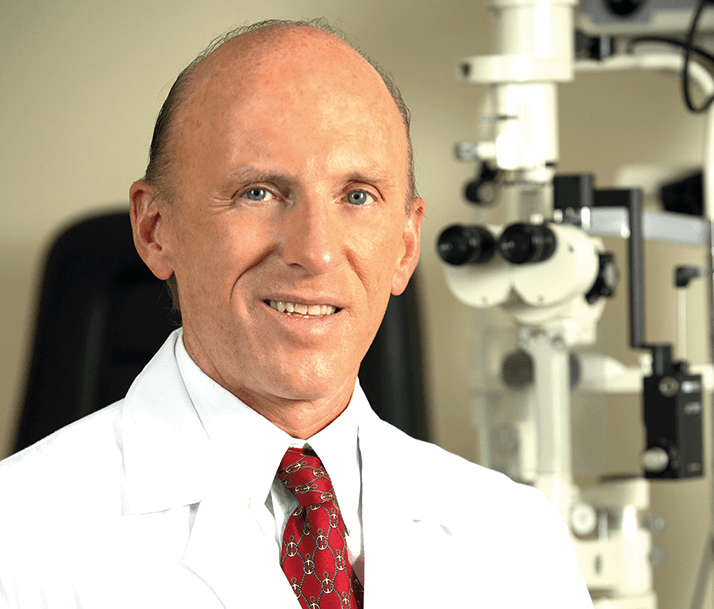
I am a vocational doctor. My parents said I started saying I was going to be a doctor when I was about four; it was all I wanted to do, though my family thought I’d be a better engineer than a doctor. I was born abroad – my family are from Catalunya, and for political reasons they had to leave Spain for a long time – but I still wanted to study medicine, and did so in Madrid. I’d encountered many medical specialties during my studies and early career, but what first exposed me to ophthalmology was a grant I received from the Joint Commission for the Promotion of Scientific Cooperation between the US and Spain, promoted by the American Medical Association, to spend my scholarship period working in the hospitals of Southwestern University, Texas, working with ophthalmologists – working as a student, There I met ophthalmologists and I discussed the specialty. It was my alpha and omega; I loved the independence of the specialty. You make your own decisions, you have your independence of the specialty, own techniques, diagnostic criteria, and if surgery is the best option – you perform the procedure yourself. This was the reason for my vocation!
You know, my training is actually in vitreoretinal surgery. I returned to Spain after a short fellowship at the Wilmer Eye Institute with Bert Glaser and Ron Michaels as a vitreoretinal surgeon. I’d been appointed a professor and chair at Spain’s youngest university at the time, Alicante in 1995 (at age 32). At that time, there was no clinical facility, so I had to start a private practice. Refractive surgical procedures at that time were underdeveloped – especially RK. I had the chance to see many patients in other places too; some had a lot of problems, but some had excellent outcomes. So the mystery was why some were so good, and some so bad – we had only a minimal understanding of why, and no clues. I spent time working with Steve Trokel, Dick Lindstrom, George Waring, and others, who were my mentors – and I am the last disciple of Charlie Kelman, who helped me to apply a lot of my vitreoretinal training to refractive surgery. We just happened to be in the right place at the right time to help it emerge. We made observations, gathered evidence, and made a science of refractive surgery.
My patients are the reason I became a doctor, so they are my priority. I entered into private practice so that I could introduce logical innovations into the real world – which was difficult in the academic environment in Spain, where innovation was not promoted. But that requires adequate funding, and it’s much easier to collaborate with industry from a private company than from an institution. This kind of cooperation is very important – we in academia come up with the ideas, but industry promotes them and makes them feasible. My practice, VISSUM, is also affiliated with a university, and medical and graduate students come there to practice. I created the Jorge Alió Foundation at the same time, to promote visual healthcare and the prevention of blindness worldwide. We are building a small eye hospital in Mauritania now, thanks to private funding. All this is because I truly believe that we should be available to everybody, not only to those who can pay.
I’m lucky to have an excellent team behind me. Without them, I would probably only be able to do 20 percent of what I do now – my day already starts very early in the morning and goes until late at night. I’m not only the head of a practice and a foundation, I’m also part of a team, and I am proud to say that. I think it’s important to remember that doctors are people, too. Many of us write or play instruments or draw or paint. I’ve been involved in art for years; I find it helps me to relax and to improve my performance. I run an artistic event, Miradas, a competition for artists in Spain whose works relate to vision. There are awards, travel scholarships, and even the opportunity to have the artwork featured on the cover of the Journal of Refractive Surgery. I think things like this remind us of how important vision is in our lives.
There are two significant topics. One is “invasive pharmacology of the eye” – the application of pharmaceuticals (or devices) inside the eye, particularly in the cornea. It’s one of our research areas of interest at the moment. We’re working on it using nanotechnology. The other is the use of lasers in eye surgery. Excimer lasers have demonstrated their capabilities over the past 25 years and now, with femtosecond lasers for cataract and corneal surgery, I think we’re experiencing the advent of a new type of surgery. I’m excited about applying modern innovations to eye surgery. There’s going to be a tremendous technological revolution in the coming years because we have so much new knowledge about the behavior of the eye and so many new pharmacological and technological tools. Over the next 10 years, this is going to develop into a new way of understanding eye surgery and an even better outlook for our patients.
